Rectal Cancer
Rectal cancer begins in the rectum, the last part of the large intestine. The rectum is part of your digestive system, connecting the rest of the colon to the anus. Rectal cancer is highly treatable when found early.
The National Cancer Institute recognizes the OHSU Knight Cancer Institute as one of the best places in the nation to receive cancer care. At the Knight you will get:
- World-class experts in rectal cancer
- Specialists who work as a team to care for you
- Treatments you can’t find anywhere else in the region
- Support services in social work, nutrition and rehabilitation
- Hundreds of clinical trials
Learn about our care for colon cancer.
Understanding rectal cancer
Lower Gastrointestinal Anatomy
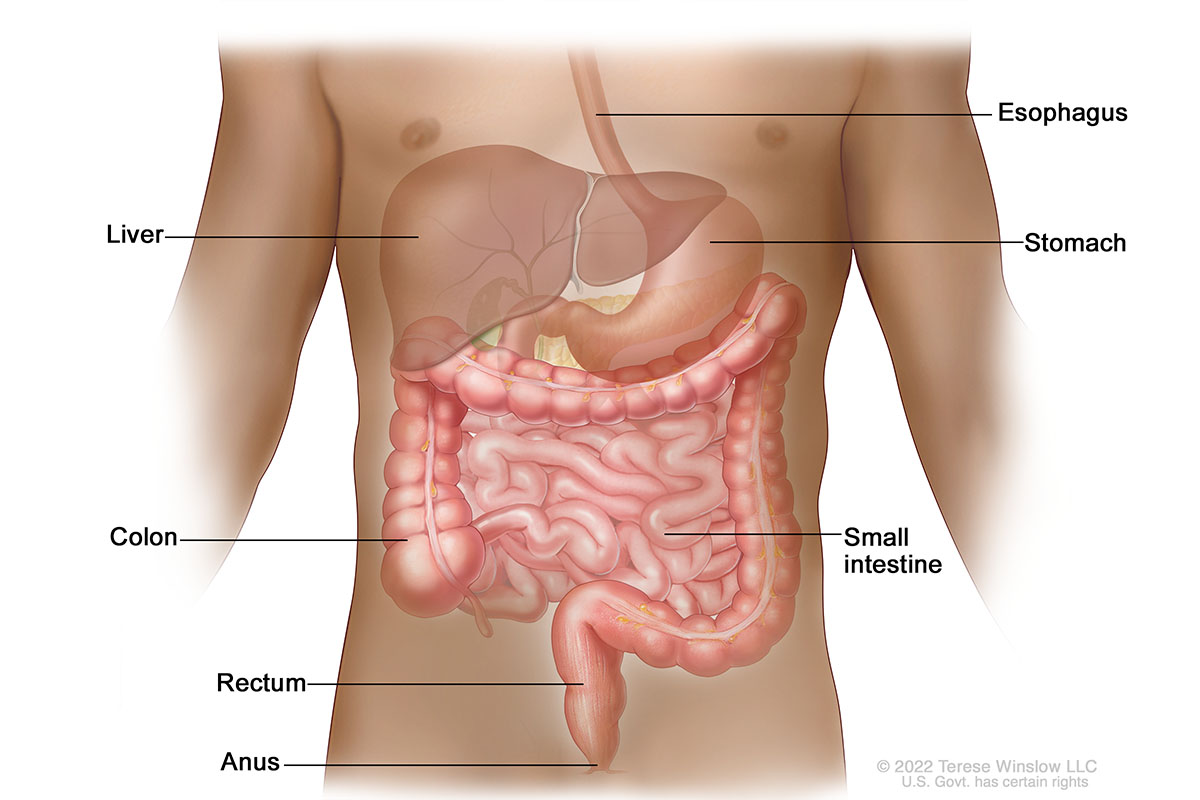
What is rectal cancer?
Rectal cancer starts in the rectum, a 5-inch tube that stores and passes stool to the anus, where it leaves the body. The rectum is the last part of the colon, which is also known as the large intestine.
Together, cancer of the colon and rectum are also called colorectal cancer.
Who gets rectal cancer?
About 46,000 people a year in the U.S. are diagnosed with rectal cancer, according to the American Cancer Society.
Risk factors include:
- Family history: Having a close relative, such as a parent or sibling, with a history of cancer or polyps (abnormal growths) in the rectum or colon increases risk.
- Age: Anyone 45 or older should be screened for colorectal cancer. If you are at higher risk, talk with your doctor. You may need testing earlier or more often.
- Diabetes: Having type 2 diabetes raises risk.
- Gastrointestinal conditions: Having inflammatory bowel disease, such as ulcerative colitis or Crohn’s disease, increases risk.
- Diet: Eating foods low in fiber and high in animal fats such as red meat can increase risk.
- Weight: Being overweight raises risk.
- Tobacco use: Smoking or using chewing tobacco raises risk.
- Inactivity: Lacking a regular exercise routine increases risk.
- Race and ethnicity: Native Americans, Alaska Natives, Jews of Eastern European descent (Ashkenazi) and Black people have higher risk.
Some people inherit genetic changes, or mutations, from their parents that increase risk. The Knight offers expert genetic testing and counseling to help you identify and manage risk.
Rectal cancer screening
Like with all cancers, rectal cancer outcomes are better when the cancer is found early.
Screening for rectal cancer uses the same tests as for colon cancer. The American Cancer Society recommends that all adults age 45 or older get regular screening. Those at higher risk may need tests earlier or more often.
Signs and symptoms of rectal cancer
Signs of rectal cancer may not appear right away. They also might seem like another illness. It’s important to see your doctor if symptoms don’t go away. Signs include:
- Changes in bowel habits, such as frequent diarrhea or narrow stools
- Blood in stools, which might make them look dark brown or black
- Ongoing discomfort in the belly, including bloating and gas
- Belly cramps or pain
- Changes in appetite
- Losing weight without trying
- Weakness or tiredness
Rectal cancer diagnosis
Good rectal cancer outcomes depend on early and accurate diagnosis. Your team at the Knight Cancer Institute will use the latest tools.
Common tests include:
- Digital rectal exam: The doctor inserts a lubricated, gloved finger into the rectum to feel for lumps or anything unusual. Providers may also examine the vagina.
- Colonoscopy: The doctor guides a tube tipped with a camera into the colon, including the rectum, to check for signs of cancer. Sign could include tumors or polyps, abnormal growths that can turn into cancer. Polyps are often removed during a colonoscopy.
- Biopsy: Your doctor removes a tissue sample to be checked under a microscope for cancer cells.
Rectal cancer stages
Doctors label cancer by stages. Stages show how much cancer is in your body, how far it has spread and how quickly it may grow. Stages help your cancer team recommend the best treatments.
Stage 0 Rectal Cancer
Abnormal cells are in the rectum’s lining, the mucosa.
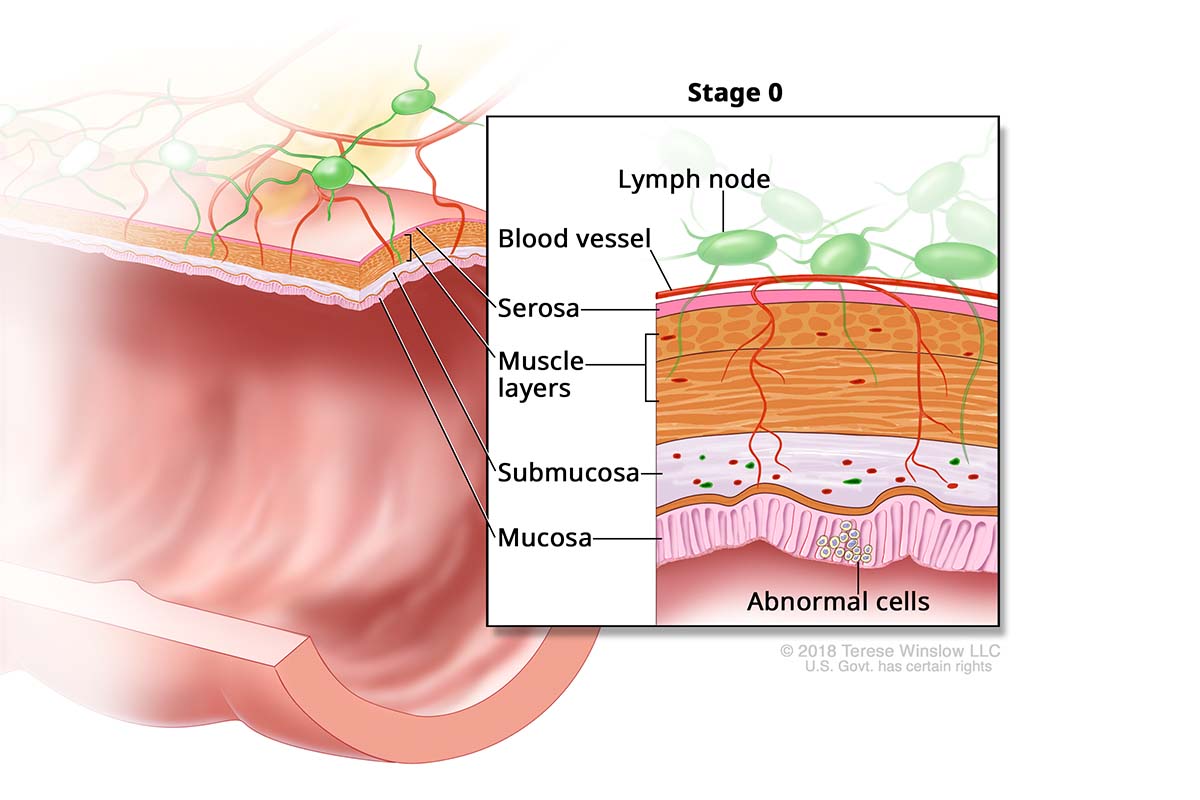
Stage I Rectal Cancer
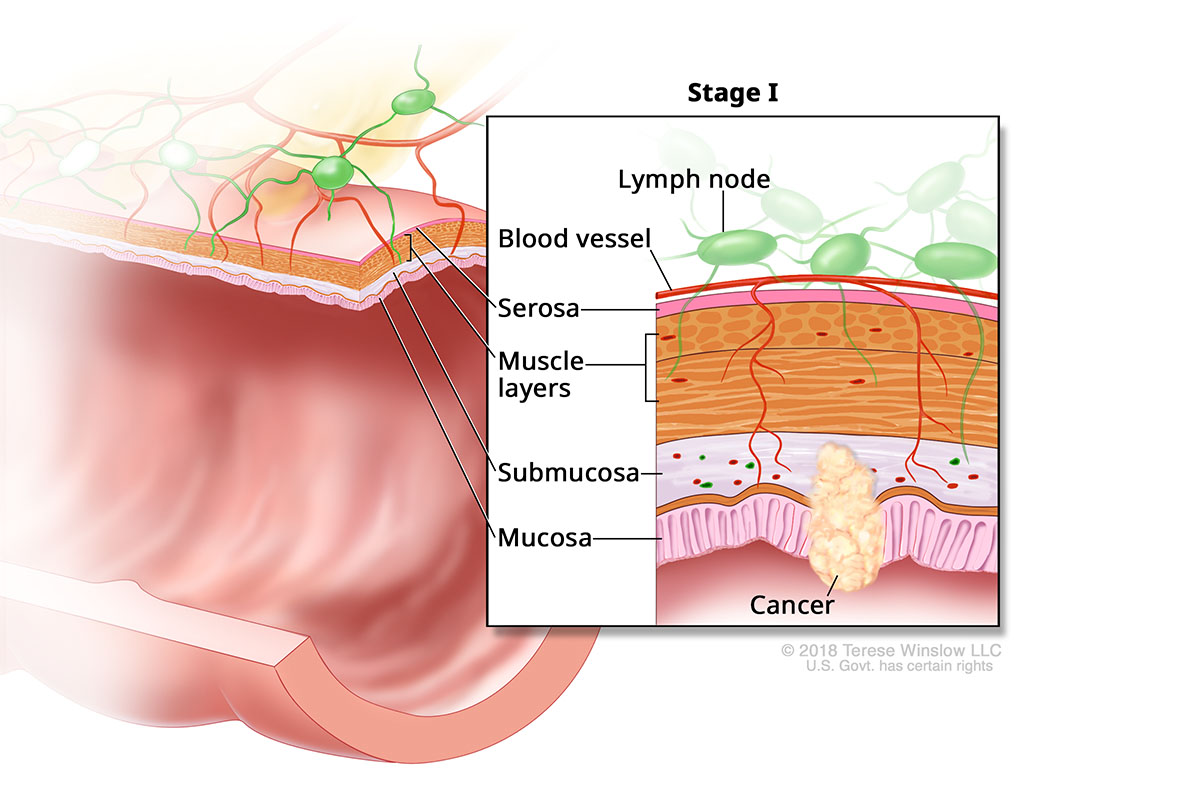
The tumor has grown into the second layer of the colon, the submucosa, or to the third layer, the muscle layer.
Stage II Rectal Cancer
Stage IIA: The tumor has reached the rectum's outer layer, the serosa.
Stage IIB: The tumor has reached the tissue that surrounds organs in the belly, the visceral peritoneum.
Stage IIC: The tumor has grown through the rectum to nearby organs.
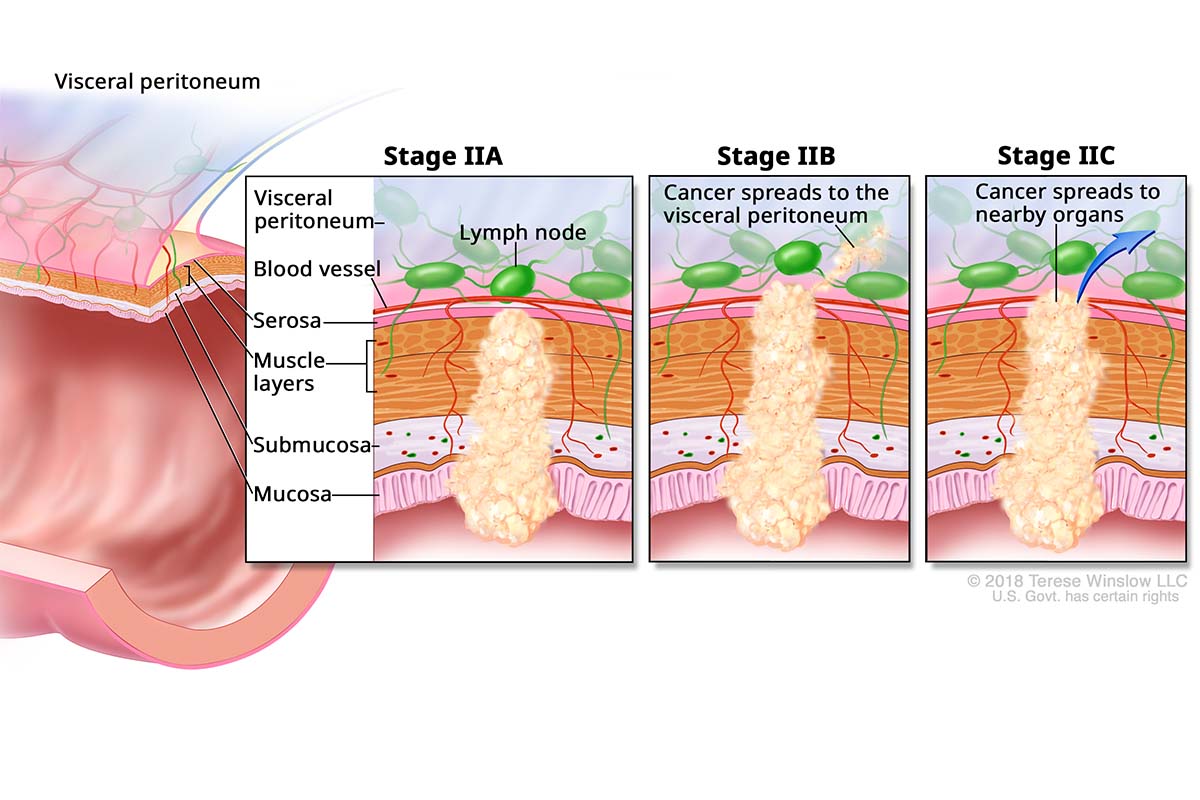
Stage III
Stage IIIA: One of these:
- The tumor has grown into the submucosa and possibly the muscle layer. Cancer is also in one to three nearby lymph nodes, or cancer cells have clustered near lymph nodes.
- The tumor has grown to the submucosa, and cancer is in four to six nearby lymph nodes.
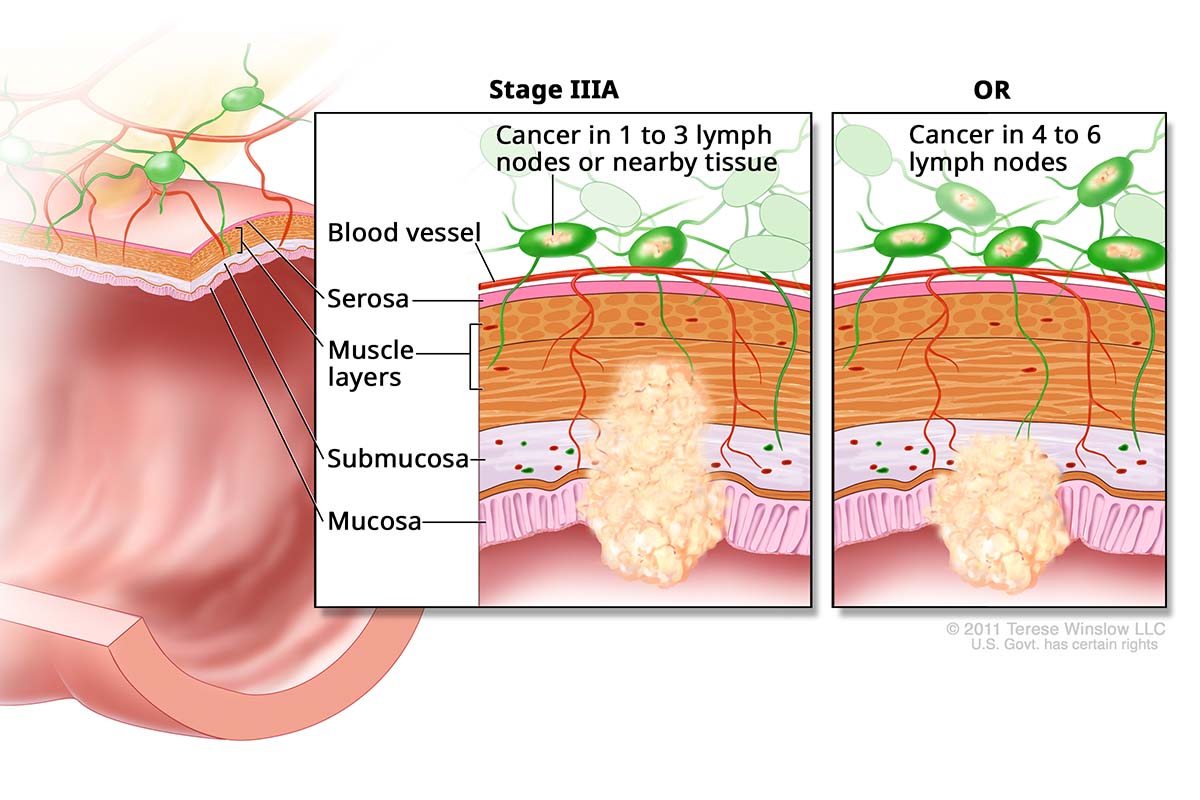
Stage IIIB Rectal Cancer
Stage IIIB: One of these:
- The tumor has spread to the serosa or to the visceral peritoneum. Cancer is also in one to three nearby lymph nodes, or cancer cells have clustered near the lymph nodes.
- The tumor has spread to the muscle layer or to the serosa, and cancer is in four to six nearby lymph nodes.
- The tumor has grown to the submucosa or to the muscle layer, and cancer is in seven or more nearby lymph nodes.
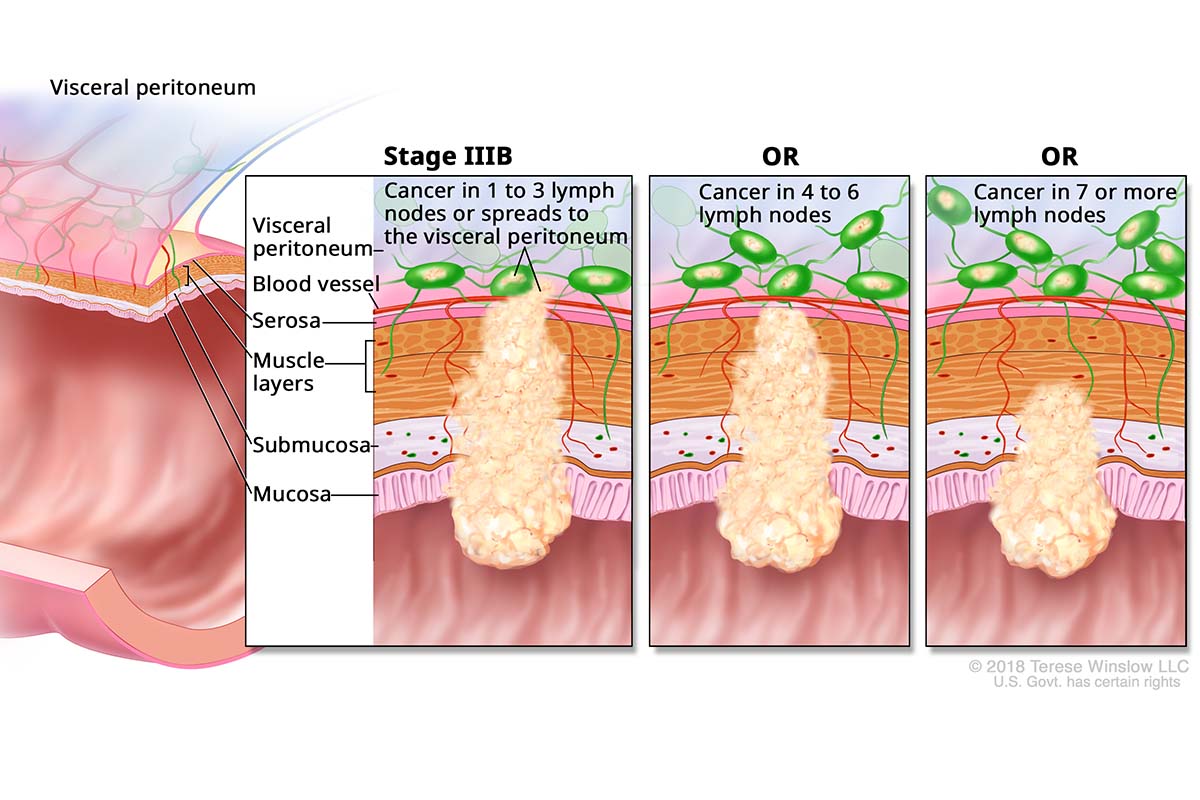
Stage IIIC Rectal Cancer
Stage IIIC: One of these:
- The tumor has spread to the visceral peritoneum, and cancer is in four to six nearby lymph nodes.
- The tumor has spread into the serosa or reached the visceral peritoneum, and cancer is in seven or more nearby lymph nodes.
- The tumor has spread to nearby organs. Cancer is also in one or more nearby lymph nodes, or cancer cells have clustered near the lymph nodes.
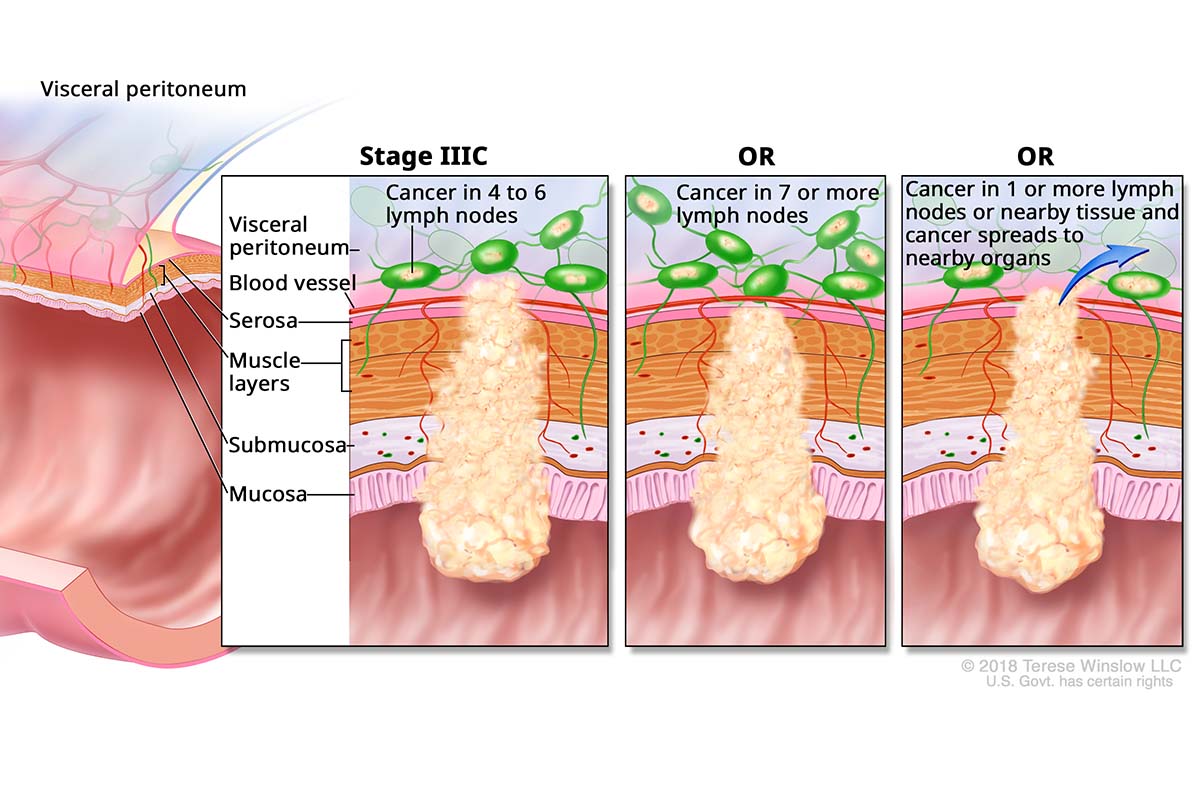
Stage IV Rectal Cancer
Stage IVA: Cancer has spread to one distant area, organ or set of lymph nodes.
Stage IVB: Cancer has spread to more than one distant area, organ or set of lymph nodes.
Stage IVC: Cancer has spread to a distant part of the belly lining (the peritoneum) and may have spread to other distant areas, organs or lymph nodes.
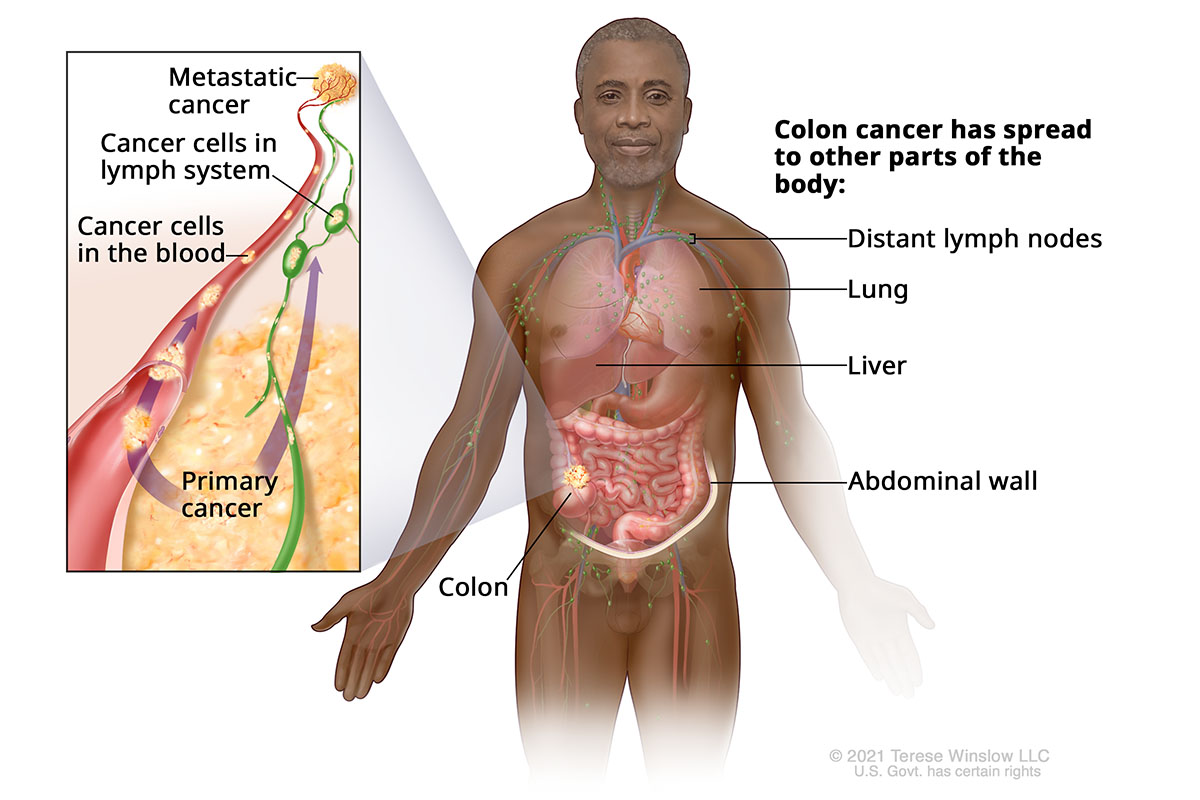
Rectal cancer treatment
Your care may include more than one treatment, though surgery is usually the main one. Your Knight care team will work with you to develop a plan for your unique needs.
Surgery
Surgery is the most common treatment for rectal cancer. Some surgeries can be done through the anus, without cutting the belly. Our surgeons use advanced techniques to save nerves and tissues linked to sexual function, bowel control and bladder control.
If you have early-stage cancer, surgery may be the only treatment you need. In some cases, removing a polyp during a colonoscopy may remove the cancer.
Surgery types
Options are based on how far cancer has spread. They include:
- Removing the cancer and nearby tissue; other tissue and lymph nodes may be checked for spread
- Using a probe with tiny electrodes to destroy cancer cells
- Using an instrument to freeze and kill cancer
Next, the surgeon does one of the following:
- Sews the rectum back together
- Sews the rectum to the colon
- Sews the colon to the anus (anastomosis)
- Makes an opening called a stoma for stool to pass into a collection bag. This procedure, a colostomy, can sometimes be reversed after the rectum heals.
- If the bladder is removed, the surgeon creates an opening for urine to flow into a collection bag. This procedure is called a urostomy.
At the Knight, we also offer advanced techniques such as hepatic arterial infusion, a treatment for rectal cancer that has spread to the liver.
Resection of the Rectum with Anastomosis
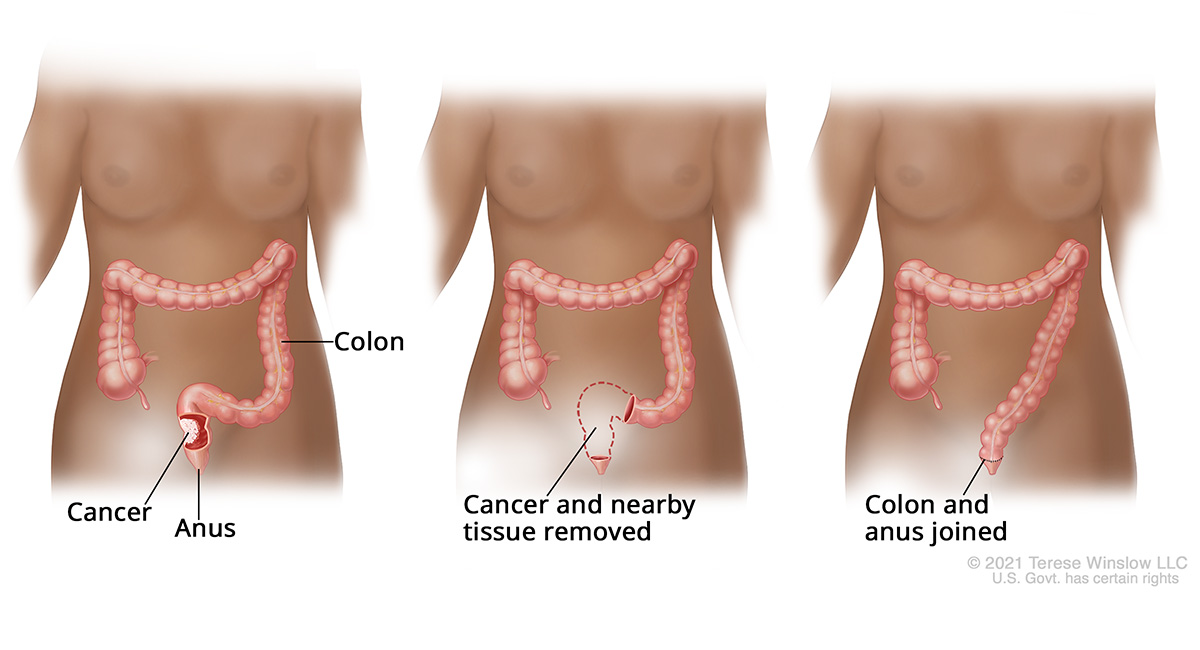
Chemotherapy
We use the latest medications and approaches to destroy or stop cancer. Chemotherapy is usually given in an IV drip.
Targeted therapy
We use advanced testing to identify genetic “targets” in your tumor. Medications can match the target to attack the cancer cell, like a key fitting into a lock.
The Knight is a pioneer in targeted therapy, which destroys cancer cells while leaving healthy cells mostly alone. For rectal cancer, targeted medications are given by IV drip or pill.
Radiation therapy
Radiation therapy uses energy beams to destroy cancer cells. We are regional leaders in image-guided radiation therapy, or IGRT.
You may have radiation therapy:
- Before surgery to shrink the tumor so it’s easier to remove
- After surgery to destroy remaining cancer cells to keep cancer from spreading or coming back
- With chemotherapy, a combination that can sometimes replace surgery
- To relieve pain when cancer has spread to organs such as the liver
Immunotherapy
Immunotherapy uses your body’s immune system to fight cancer. Immunotherapy drugs help your body better recognize and destroy cancer cells.
In rectal and colon cancers, medications called “checkpoint inhibitors” can sometimes stop cancer cells from sending signals that hide them from the immune system. At the Knight, genetic tests can help us see if this therapy might help you.
Additional services
At the Knight, we offer you and your family a range of services to support your care and well-being. They include:
- Clinical trials that offer access to promising new treatments
- Palliative care, to help with symptoms and anxiety at any stage of cancer care
- Dietitians with expertise in cancer to help with nutrition before, during and after treatment
- Social workers with cancer training to help with issues such as transportation or lodging
Clinical trials
Clinical trials test new treatments in humans. The Knight is a leader in clinical trials, offering early access to promising therapies.
Rectal cancer team
Surgery
-
- Robert L. Eil, M.D.
- Accepting new patients
-
- Sandy H. Fang, M.D., FACS, FASCRS (she/her)
- Accepting new patients
-
- Daniel O. Herzig, M.D., M.B.A., FACS, FASCRS (he/him)
- Accepting new patients
-
- Kim C. Lu, M.D., FACS, FASCRS (he/him)
- Accepting new patients
-
- Skye C. Mayo, M.D., M.P.H., FACS
- Accepting new patients
-
- Flavio G. Rocha, M.D., FACS, FSSO
- Accepting new patients
-
- Divya Sood, M.D.
- Accepting new patients
-
- V. Liana Tsikitis, M.D., M.B.A., M.C.R., FACS, FASCRS (she/her)
- Accepting new patients
-
- Patrick J. Worth, M.D., M.C.R., FACS, FSSO (he/him)
- Accepting new patients
Medical oncology
-
- Emerson Y. Chen, M.D.
- Accepting new patients
-
- Jeff Donovan, PA-C
- Accepting new patients
-
- Adel Kardosh, M.D., Ph.D.
- Accepting new patients
-
- Charles D. Lopez, M.D., Ph.D.
- Accepting new patients
-
- Guillaume Pegna, M.D.
- Accepting new patients
Radiation oncology
-
- Nima Nabavizadeh, M.D.
- Accepting new patients
Gastroenterology
Medical genetics
-
- Kelly Jo Hamman, M.S., CGC
- Accepting new patients
Learn more
- Rectal Cancer Treatment, National Cancer Institute
- Colorectal Cancer, American Cancer Society
- Resources for patients and families, OHSU
Location
Knight Cancer Institute, South Waterfront
Center for Health & Healing, Building 2
3485 S. Bond Ave.
Portland, OR 97239
Free parking for patients and visitors
Refer a patient
- Refer your patient to OHSU.
- Call 503-494-4567 to seek provider-to-provider advice.
Cancer clinical trials
Clinical trials allow patients to try a new test or treatment.
Read more
Learn more about OHSU Knight Cancer Institute treatments: